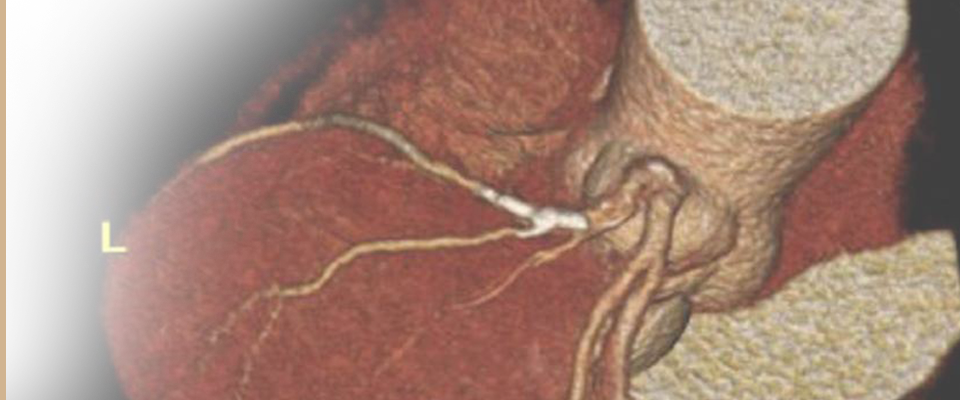CME, CBCCT BOARD PREP OR RE-CERTIFICATION
This is a comprehensive Self-Study program for Radiologists and Cardiologists to maintain credentials, sit for the CBCCT exam as well as update their interpretive skills. These materials will be presented in an on-line format where the student will evaluate didactic material, images and animations relevant to the study of Cardiac CTA.
Each course topic concludes with an interactive quiz to guage the learner's retention of the materials presented.

Additional Course Information
1) Comprehensive review of CT scanner technology, scan planning, acquisition, image formation, reconstruction, and viewing formats for the reader and or technologist of cardiac CT.
2) A complete overview of calcium scoring as well as the data to support it.
3) Factors influencing radiation production and radiation safety as it relates to cardiac CT. Application of radiation sparing techniques.
4) Appropriate criteria surrounding the patient selection process for cardiac CT and the importance of adequate patient preparation and selection for cardiac CT.
5) Disease prevalence VS Predictive value and analyzing diagnostic accuracy of Cardiac CTA and the data that support its use.
6) Improve accuracy in reading cardiac CT, identify the artifacts and pitfalls in image interpretation.
7) Successfully identify and evaluate coronary anatomy, coronary anomalies and stent and bypass graft interpretation using cardiac CT.
8) Identify important noncoronary cardiac findings assessed by cardiac CTA.
9) Identify noncardiac findings that may be seen on cardiac CTA.
Multi-slice CT angiography is becoming commonplace as a diagnostic tool in an expanding suite of clinical indications. With the continued increase in acceptance and usage of Cardiac Computed Tomography Angiography (Cardiac CTA), there is a growing demand for Cardiologists and Radiologists that are board certified in Cardiac CTA. Many of these physicians have been trained to interpret Cardiac CTA and seek to sit for and pass the Cardiac CTA Board Examination.
MDT's Cardiac CTA Faculty believe that in this ever changing medical environment where imaging is heavily scrutinized, board certification in cardiac CT angiography will become ever more important to assure reimbursement and credentialing.
Given that it is ever more important to be board certified and that physicians are very busy and need to minimize time away from practice and home, a self assessment, on line, at home, board review program that is concise, complete and to the point is essential to efficient board review preparation.
Prospective imaging is now routine for radiation reduction. Lower Kv may be used when possible for radiation reduction and utilizing iterative reconstruction for radiation reduction. ECG dose modulation is always in effect. This courses content covers these techniques and protocols and outlines their applications to the participant.
In recent years, clinical trials have been published identifying new uses for CT Angiography in The Emergency Room for triage, in clearance of patients before non- cardiac surgery, in assessment of intermediate risk patients with uninterruptible stress tests or who are unable to exercise. Also, with each passing year there are improvements in procedural protocols and in radiation dose reduction which impacts image quality.
Internal Journal of Cardiology 132 (2009) 25-29; J.Am.Coll.CArdiol.Intv.2008;1;176-182; JAMA. 2007;298(3):317-323 Int J Cardiovasc Imaging (2008) 24:331-342; Journal of Cardiovascular Computed Tomography (2009) Article in Press
Richard L. Hallett M.D.
Northwest Radiology Network, PC
Clinical Assistant Professor at Stanford University Medical Center:
Department of Radiology
Cadiovascular Imaging Section
Steven Mottl, D.O.
Director of Clinical Education
MD Training @home, LLC
Board certified in Internal Medicine and Cardiology
Subspecialty board certification: Echocardiography, Nuclear Cardiology, Vascular Imaging
The University of Arizona College of Medicine – Tucson designates this enduring materials activity for a maximum of 20 AMA PRA Category 1 Credit(s)TM. Physicians should claim only the credit commensurate with the extent of their participation in the activity.
Current CME Approval Period: 11/26/2024 to 11/25/2026
Date of Last Review: 11/26/2024
Original Release Date: 4/1/2011
Commercial Support: None
UA Continuing Medical Education
PO Box 245121
Tucson, AZ, 85724-5121
(520)626-7832
FAX (520)626-2427
uofacme@u.arizona.edu
www.ocme.arizona.edu
All individuals in a position to control the content of this CME activity have disclosed that they have no relevant financial relationships with ineligible companies that would constitute a conflict of interest concerning this CME activity.
Each module of this course consists of two online components: Didactics and Quizzing. All materials are presented in an on-line format and participants will interact with the content within MD Training @home's web based eLearning environment. The program requires no specialized connection or software and supports all major browsers on PC and Mac platforms.